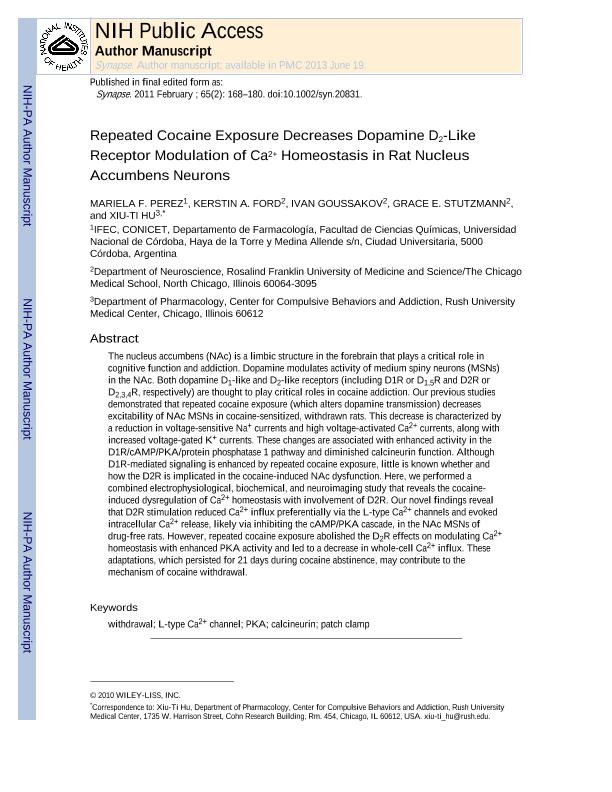Artículo
Repeated cocaine exposure decreases dopamine D2-like receptor modulation of Ca2+ homeostasis in rat nucleus accumbens neurons
Fecha de publicación:
02/2011
Editorial:
Wiley-liss, div John Wiley & Sons Inc.
Revista:
Synapse
ISSN:
0887-4476
e-ISSN:
1098-2396
Idioma:
Inglés
Tipo de recurso:
Artículo publicado
Clasificación temática:
Resumen
The nucleus accumbens is a limbic structure in the forebrain which plays a critical role in cognitive function and addiction. Dopamine modulates activity of medium spiny neurons in the nucleus accumbens. Both dopamine D1-like and D2-like receptors (including D1R or D1,5R, and D2R or D2,3,4R, respectively) are thought to play critical roles in cocaine addiction. Our previous studies demonstrated that repeated cocaine exposure (which alters dopamine transmission) decreases excitability of nucleus accumbens medium spiny neurons in cocaine-sensitized, withdrawn rats. This decrease is characterized by a reduction in voltage-sensitive Na+ currents and high voltage-activated Ca2+ currents, along with increased voltage-gated K+ currents. These changes are associated with enhanced activity in the D1R/cAMP/PKA/protein phosphatase 1 pathway and diminished calcineurin function. Though D1R-mediated signaling is enhanced by repeated cocaine exposure, little is known whether and how the D2R is implicated in the cocaine-induced nucleus accumbens dysfunction. Here, we performed a combined electrophysiological, biochemical, and neuroimaging study that reveals the cocaine-induced dysregulation of Ca2+ homeostasis with involvement of D2R. Our novel findings reveal that D2R stimulation reduced Ca2+ influx preferentially via the L-type Ca2+ channels and evoked intracellular Ca2+ release, likely via inhibiting the cAMP/PKA cascade, in the nucleus accumbens medium spiny neurons of drug-free rats. However, repeated cocaine exposure abolished the D2R effects on modulating Ca2+ homeostasis with enhanced PKA activity and led to a decrease in whole-cell Ca2+ influx. These adaptations, which persisted for 21 days during cocaine abstinence, may contribute to the mechanism of cocaine withdrawal.
Palabras clave:
Withdrawal,
,
L-type Ca2+ channel
,
PKA
,
Patch clamp
Archivos asociados
Licencia
Identificadores
Colecciones
Articulos(IFEC)
Articulos de INST. DE FARMACOLOGIA EXPERIMENTAL DE CORDOBA
Articulos de INST. DE FARMACOLOGIA EXPERIMENTAL DE CORDOBA
Citación
Perez, Mariela Fernanda; Ford, Kerstin A.; Goussakov, Ivan; Stutzmann, Grace E.; Hu, Xiu-Ti; Repeated cocaine exposure decreases dopamine D2-like receptor modulation of Ca2+ homeostasis in rat nucleus accumbens neurons; Wiley-liss, div John Wiley & Sons Inc.; Synapse; 65; 2; 2-2011; 168-180
Compartir
Altmétricas




